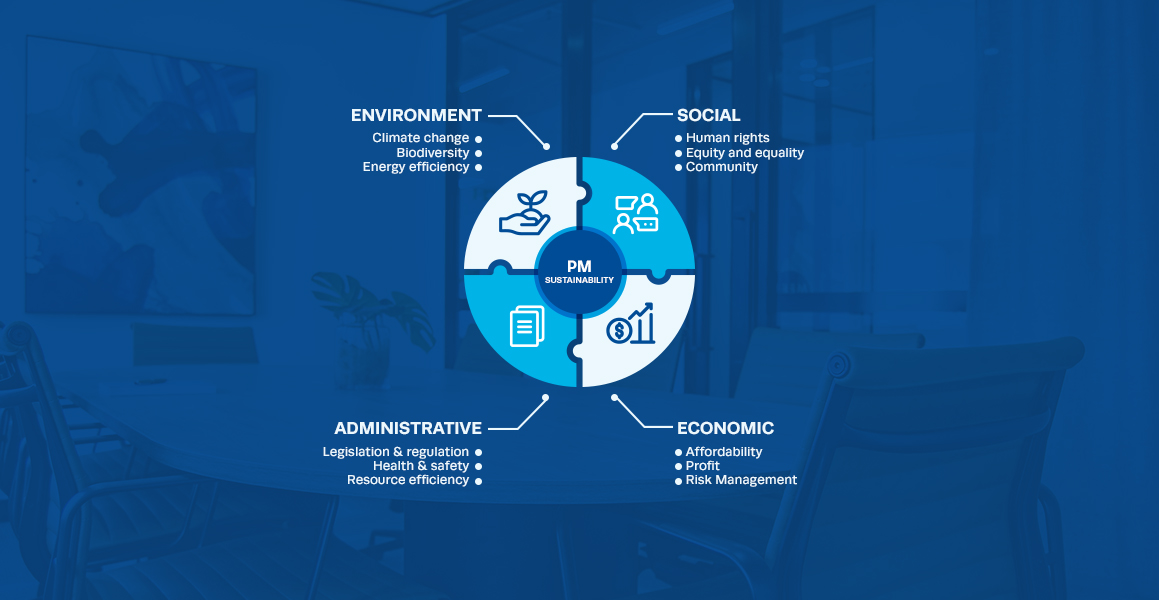Need advice? Call Now, Schedule a Meeting or Contact Us


Speak to an advisor
Explore sustainability in project management and how project managers can take an active role in contributing to global sustainability efforts.
Projects are instrumental in achieving sustainable solutions. In 2015, the United Nations set forward the 17 Sustainable Development Goals of the United Nations to shape a sustainable future as a global agenda for all, including the project management profession.
Sustainable Project Management is the planning, monitoring, and controlling of project delivery and support processes, with consideration of the environmental impacts, economic impact economic, and social aspects of such projects.
The life-cycle of projects is aimed at realizing benefits for stakeholders and performed in a transparent, fair, and ethical way that includes proactive stakeholder participation. (Gilbert Silvius, 2015, Considering Sustainability in Project Management Processes).
A good way of making sure the next project manager stays sustainable is to have that sustainability goal in mind from the beginning of the project. Once it is put into the vision of the most sustainable project managers, it cannot be forgotten. Having sustainability be relevant in all project areas will ensure that environmental damage is minimized.
As project managers direct the consumption of project resources, they should consider the impact on climate change mitigation, and other sustainable factors, both inside and outside of the organization, over the entire life cycle of a project.
That is why they must use a sustainable life cycle mentality, from a project’s beginning to its end.
The very core reason for this is, as we already mentioned, that a holistic approach to sustainability involves balancing energy metrics in four different areas. Those include:
Considering the project managers working all of them together is key to building truly sustainable projects.
Strategic Project & Programme Management Diploma can help you to implement strategic sustainability initiatives. This course bridges the gap between strategy and implementation of sustainable resources.
Environmental sustainability means tackling climate change by using sustainable natural resources, preventing pollution, and reducing the effects of climate change. This requires evaluating equipment, resources used for a project's resources, environment, industry standards, and purchasing practices.
Fairtrade is one of the best options for making sure you stay sustainable as it is an arrangement designed to help producers in growing countries achieve sustainable and equitable trade relationships.
This ties into economic sustainability by looking beyond the return on investment (ROI) and ensuring the project fits into the organization’s overall strategy by analyzing how much it contributes and how viable it is long-term.
Other than the environmental and economic areas of an organization, the less talked about, but equally as important, for building sustainability are social and administrative areas. Ensuring the organization is socially sustainable means evaluating the sustainability of its culture, structure, and human resource skills and practices. The organization needs to make sure it provides good working conditions and has good health and safety measurements.
This part project management job is often associated with the human resources sector hence why they are often regarded as the agent of sustainability in any given organization. They ensure that there is no discrimination against vulnerable groups and that civil and other fundamental rights and human rights are respected. They are also in charge of employee training and skills development and general community involvement – both significant social areas.
Because projects are temporary, many may be confused about how they can be efficient if sustainability plays the long game. But, projects help organizations realize long-term investment objectives. Projects and project management take place in an environment that is broader than that of the project itself.
Seeing as all projects are an essential part of an organization’s strategy, there are factors influencing its success, both internal and external. Those factors are either helping it succeed or making it difficult for a green project management move to have a positive outcome.
Understanding them can help plan a project and ensure it stays “green”. In much the same way a project manager must balance economic factors of cost, schedule, and scope, some trade-offs must also be made between the economic, social, and environmental factors surrounding a sustainable project management move.
Project managers usually only focus on getting from an idea to an implemented project, disregarding the long-term consequences of manufacturing and disposal. They must start taking responsibility for the project’s results as its impact does not go away once the project is done.
The project management profession at large should promote Sustainable Development Goals by developing objectives, and plans and setting them into practice in a given context. A global association for project management sustainability like IPMA can provide the project management sustainability profession with its good practices (e.g. standards) and recognize the achievement of sustainability in projects (e.g. through achievement awards).
Achieving sustainability in project management requires an active role of all people involved in the project, programs, and portfolios. From Astana, the members of IPMA issue a global call to action to actively support sustainable project management by increasing the awareness and adoption of more of sustainable project management practices and competencies.
IPMA President Reinhard Wagner confirmed IPMA’s stance saying:
“Listening to the daily news makes me feel that we really need to change something. The 17 Sustainable Development Goals of the UN lead the way and are an urgent call for all people engaged in the field of project management. We are the change! We can make a difference in the way we manage projects.’’
Projects are a means to make change happen, deliver new products and services, take unique new challenges, and thus shape our society. Projects and project management help our society to achieve the Sustainable Development Goals. Sustainability shouldn’t just be an afterthought in sustainability projects but should be one of the goals for project delivery.
Thus, project management needs to consider sustainability as one, if not the most important project success, factor.
As the world grapples with the consequences of climate change and environmental degradation, it has become increasingly evident that businesses have a significant role to play in creating a more sustainable future. Project managers, with their unique skills and expertise, are well-positioned to drive this shift and guide companies toward a more sustainable direction.
Project managers serve as the orchestrators of change within organizations. They possess a comprehensive understanding of project lifecycles, stakeholder management, resource allocation, and risk mitigation. By integrating sustainability principles into their project management practices, they can ensure that sustainability becomes an integral part of a company's strategic objectives.
One of the critical roles of project managers in fostering sustainability is the incorporation of environmental considerations throughout the project lifecycle. From project initiation to closure, they can assess the environmental impact of projects and identify opportunities for reducing carbon emissions, minimizing waste, and conserving natural resources.
By conducting thorough environmental assessments, project managers can make informed decisions, implement eco-friendly practices, and choose sustainable suppliers and materials.

Project managers can influence the adoption of sustainable technologies and practices within their organizations. They can identify innovative solutions and promote their integration into project plans, enabling companies to reduce their carbon footprint and operate more efficiently. By staying informed about emerging trends and advancements in sustainable practices, project managers can introduce cutting-edge strategies that align with environmental goals.
Sustainable project management holds great promise and importance for future generations. As the global awareness and urgency surrounding environmental and social issues continue to grow, organizations and project managers are recognizing the need to integrate sustainability into their projects. In the coming years, we can expect to see a greater emphasis on incorporating technologies and strategies into project planning, execution, and evaluation.
This will involve leveraging renewable energy sources, adopting green construction and procurement practices, implementing circular economy principles, and prioritizing social responsibility. Additionally, advancements in technology, such as artificial intelligence and data analytics, will play a significant role in enabling more accurate sustainability assessments, resource optimization, supply chain, and environmental impact monitoring.
Furthermore, project managers will increasingly collaborate with diverse stakeholders, including civil and fundamental rights, local communities and environmental experts, to ensure that projects align with the principles of sustainability and meet the evolving needs of society.
IPMA understands the importance of standing out in today's competitive business landscape. Our comprehensive program equips individuals with the skills and knowledge needed to have a competitive edge in delivering the most energy-efficient business solutions in any industry.
Resources















